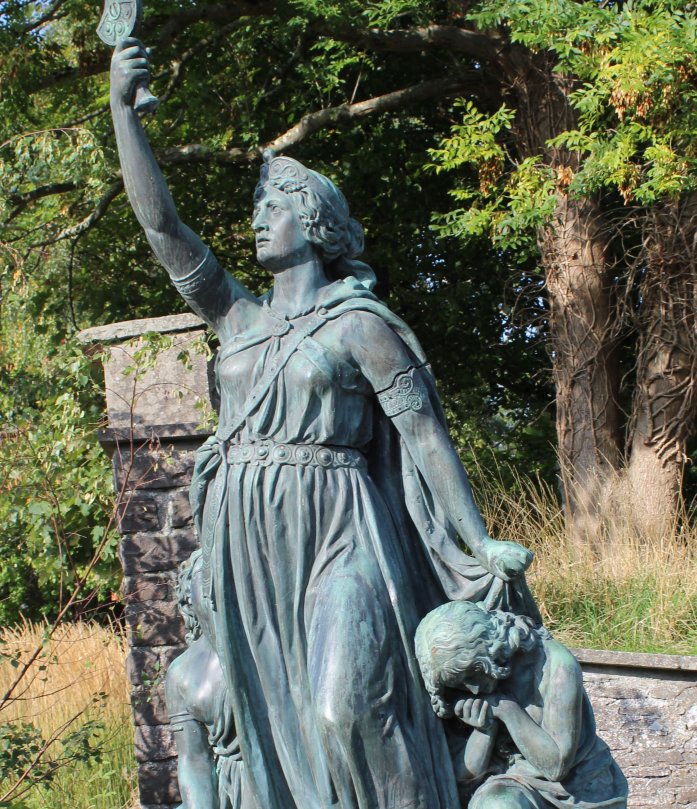The Iceni’s Queen Boudicca Who Revolted Against Roman Rule
A. Sutherland - AncientPages.com - The Iceni people were British Celts who occupied the area of modern Norfolk, Cambridgeshire, and northwest Suffolk. The tribe represented a significant power in eastern Britain during Claudius' conquest of Britain in 43 AD.
1855 Bronze statue of Boadicea (Boudica) and her daughters, at Captain's Walk in Brecon, Powys, Wales; by sculptor John Thomas. Image credit: 14GTR - CC BY-SA 4.0
In 47 AD, the Iceni rose in revolt after the Romans tried to enforce a law forbidding the carrying of weapons and increasing Roman influence on the tribe's affairs; their protest was put down, and Prasagustas was established as a client king.
Prasutagas decided that it would be wise to make his will assigning half of his personal property to the Roman emperor, and so it remained. However, when he died in 61 AD, the situation changed. The king's will was ignored, and the kingdom was annexed.
Boudica, Prasutagas's widow and queen of the Iceni tribe, was publicly flogged, her daughters raped, and the estates of the most prominent Iceni men were confiscated. In 61 AD, Boudicca raised the Iceni and the neighboring Trinivantes tribe in revolt against Roman rule.
She destroyed the invaders and chose Londinium as a critical target for her uprising. On her way to Londinium (modern London), Boudica and her army destroyed Camulodunum (modern Colchester), at that time a settlement for discharged Roman soldiers and the site of a temple to the former Emperor Claudius.
Boudicca's treatment of her enemies was brutal, and she must have given the Romans a terrific scare. One legion was so terrified that they refused to move against her. When the Iceni reached Londinium, they pillaged and burned down the city, killing all remaining inhabitants.
At first, the authorities could not prevent the Boudican revolt's advance. Upon hearing of the uprising, Governor Gaius Suetonius Paulinus hurried from the island of Anglesey off the northwest coast of Wales to Londinium to save the city. However, due to the lack of sufficient forces, he could not. He instead decided to sacrifice the single city of Londinium to save the entire province and gave the signal to abandon the city as soon as possible.
The inhabitants were allowed to accompany him. Only women, old or attached to the place, stayed in the city. An estimated 70,000–80,000 Romans and British were killed in the three towns by those led by Boudica. Suetonius, meanwhile, regrouped his soldiers and, despite being heavily outnumbered, defeated the Britons at the Battle of Watling Street.
The Roman historian Tacitus (56 AD – 117 AD) wrote about what Suetonius told his men before the fight:
"Ignore the racket made by these savages. They are not soldiers - they're not even properly equipped. There are more women than men in their ranks. We've beaten them before, and when they see our weapons and feel our spirit, they'll crack. Stick together. Throw the javelins, then push forward: knock them down with your shields and finish them off with your swords. Forget about plunder. Just win, and you'll have everything."
It was only with some difficulty that the Romans quelled the Iceni uprising. Londinium, the thriving port growing on the banks of the River Thames, was left in ruins. At first, Boudicca's fate was unknown, but later, people began to believe that she took her own life by taking poison rather than falling into her enemies' hands.
The Romans established a new capital in the Iceni lands at Caistor-by-Norwich. No record of the Iceni exists after this point, though legends suggest that many fled west into Wales and eventually settled in Ireland.
By the Middle Ages, Boudica was forgotten. She was not mentioned in "Historia Brittonum" by Venerable Bede, the earliest prose stories "Mabinogion' or Geoffrey of Monmouth's 'History of the Kings of Britain.'
There is a tendency to think of Boudicca as a great patriotic leader of the British, perhaps the first national heroine.
Many others do not consider her particularly appealing character.
Written by – A. Sutherland - AncientPages.com Senior Staff Writer
Updated on August 21, 2024
Copyright © AncientPages.com All rights reserved. This material may not be published, broadcast, rewritten or redistributed in whole or part without the express written permission of AncientPages.com
Expand for referencesReferences:
R. Hingley, Boudica: Iron Age Warrior Queen
Charles River Editors. Londinium
More From Ancient Pages
-
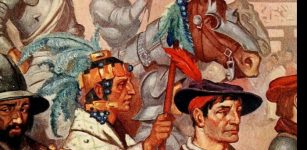 On This Day In History: Spanish Conquistadors Led By Hernan Cortés Entered The Aztecs Capital Tenochtitlán – On Nov 8, 1519
News | Nov 8, 2016
On This Day In History: Spanish Conquistadors Led By Hernan Cortés Entered The Aztecs Capital Tenochtitlán – On Nov 8, 1519
News | Nov 8, 2016 -
 Viking Cemetery In Lutomiersk And DNA May Solve The Mystery Of Norse Warriors In Central Poland
Vikings | Jan 7, 2025
Viking Cemetery In Lutomiersk And DNA May Solve The Mystery Of Norse Warriors In Central Poland
Vikings | Jan 7, 2025 -
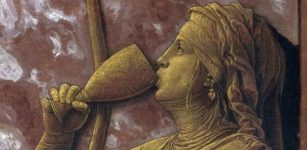 What Happened To Drunken Women In Ancient Rome?
Featured Stories | Aug 30, 2023
What Happened To Drunken Women In Ancient Rome?
Featured Stories | Aug 30, 2023 -
 Why Did Ancient Egyptian Scribes Face Serious Health Risks?
Archaeology | Jun 27, 2024
Why Did Ancient Egyptian Scribes Face Serious Health Risks?
Archaeology | Jun 27, 2024 -
 Yokai Kijo (Kidjo): Demoness, Cannibal With Hideous Heart Is A Moral Reminder In Japanese Beliefs
Featured Stories | Apr 28, 2024
Yokai Kijo (Kidjo): Demoness, Cannibal With Hideous Heart Is A Moral Reminder In Japanese Beliefs
Featured Stories | Apr 28, 2024 -
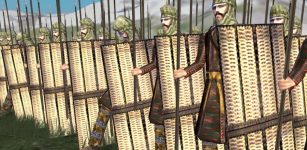 Who Were Persian ‘Sparabara’?
Featured Stories | Aug 28, 2017
Who Were Persian ‘Sparabara’?
Featured Stories | Aug 28, 2017 -
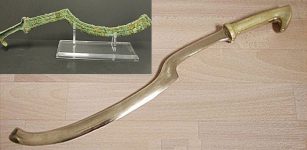 Khopesh Sword – Symbolic Weapon Of The Pharaohs And Emblem OF Egyptian Deities
Artifacts | May 27, 2021
Khopesh Sword – Symbolic Weapon Of The Pharaohs And Emblem OF Egyptian Deities
Artifacts | May 27, 2021 -
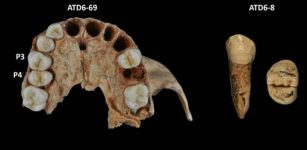 Neanderthals Are Not The Only Species Whose Dentition Is Characterized By The Possession Of Thin Enamel
Archaeology | Jan 19, 2023
Neanderthals Are Not The Only Species Whose Dentition Is Characterized By The Possession Of Thin Enamel
Archaeology | Jan 19, 2023 -
 Future Of Thornborough Henges Secured – Stonehenge Of The North Preserved For The Nation
News | Feb 3, 2023
Future Of Thornborough Henges Secured – Stonehenge Of The North Preserved For The Nation
News | Feb 3, 2023 -
 Was Biblical King David Unknowingly Part Of A Secret Master Plan?
Ancient Mysteries | Jul 1, 2021
Was Biblical King David Unknowingly Part Of A Secret Master Plan?
Ancient Mysteries | Jul 1, 2021 -
 Fortified Bronze Age City Filled With Magnificent Ancient Treasures Solves A Mystery In China
Archaeology | Nov 21, 2023
Fortified Bronze Age City Filled With Magnificent Ancient Treasures Solves A Mystery In China
Archaeology | Nov 21, 2023 -
 America’s Mysterious Pedro Mountain Mummy And The Hidden Race Of Little People
Featured Stories | Jul 3, 2014
America’s Mysterious Pedro Mountain Mummy And The Hidden Race Of Little People
Featured Stories | Jul 3, 2014 -
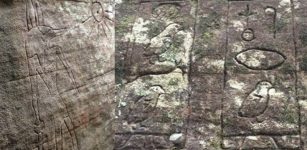 Mysterious Gosford Glyphs: Remarkable Ancient Egyptian Hieroglyphs Discovered In Australia Could Re-Write History
Featured Stories | Feb 20, 2020
Mysterious Gosford Glyphs: Remarkable Ancient Egyptian Hieroglyphs Discovered In Australia Could Re-Write History
Featured Stories | Feb 20, 2020 -
 How Ancient Scientists Calculated The Circumference Of The Earth
Ancient History Facts | May 1, 2017
How Ancient Scientists Calculated The Circumference Of The Earth
Ancient History Facts | May 1, 2017 -
 Unique 1,300-Year-Old Pala Period Idol Of Snake Goddess, Nag Devi Discovered Near Nalanda University, India
Archaeology | Apr 5, 2022
Unique 1,300-Year-Old Pala Period Idol Of Snake Goddess, Nag Devi Discovered Near Nalanda University, India
Archaeology | Apr 5, 2022 -
 What Was An Aztec Confession?
Ancient History Facts | Jul 25, 2017
What Was An Aztec Confession?
Ancient History Facts | Jul 25, 2017 -
 Ireland’s Population Was In Decline When Vikings Arrived To Settle
Archaeology | Aug 22, 2019
Ireland’s Population Was In Decline When Vikings Arrived To Settle
Archaeology | Aug 22, 2019 -
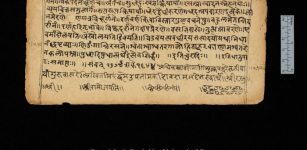 Ancient Grammatical Puzzle Solved After 2,500 Years
Linguistic Discoveries | Dec 15, 2022
Ancient Grammatical Puzzle Solved After 2,500 Years
Linguistic Discoveries | Dec 15, 2022 -
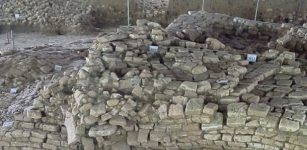 Wrecks of ancient ships found in Malaysia’s Sungai Batu ancient site
News | Sep 4, 2015
Wrecks of ancient ships found in Malaysia’s Sungai Batu ancient site
News | Sep 4, 2015 -
 Ancient Symbol Seed Of Life Contains Hidden Secrets Of The Seven Days Of Creation
Ancient Symbols | Oct 8, 2017
Ancient Symbol Seed Of Life Contains Hidden Secrets Of The Seven Days Of Creation
Ancient Symbols | Oct 8, 2017

